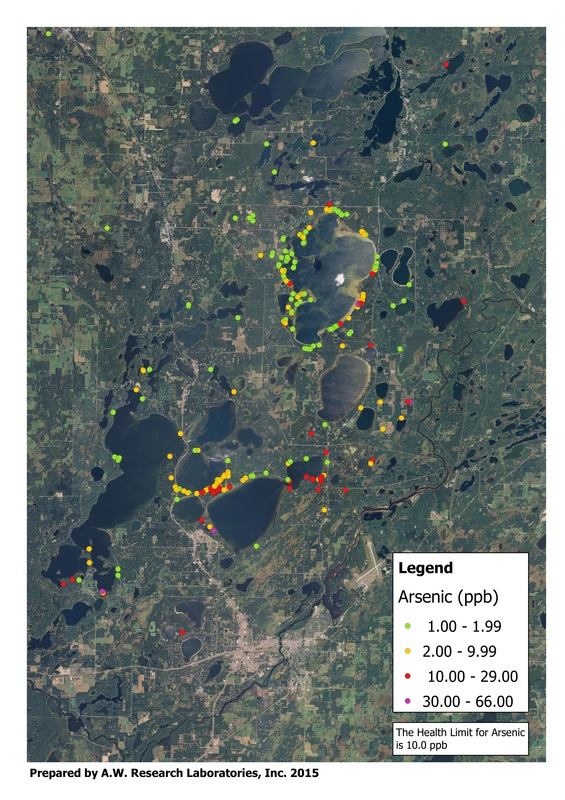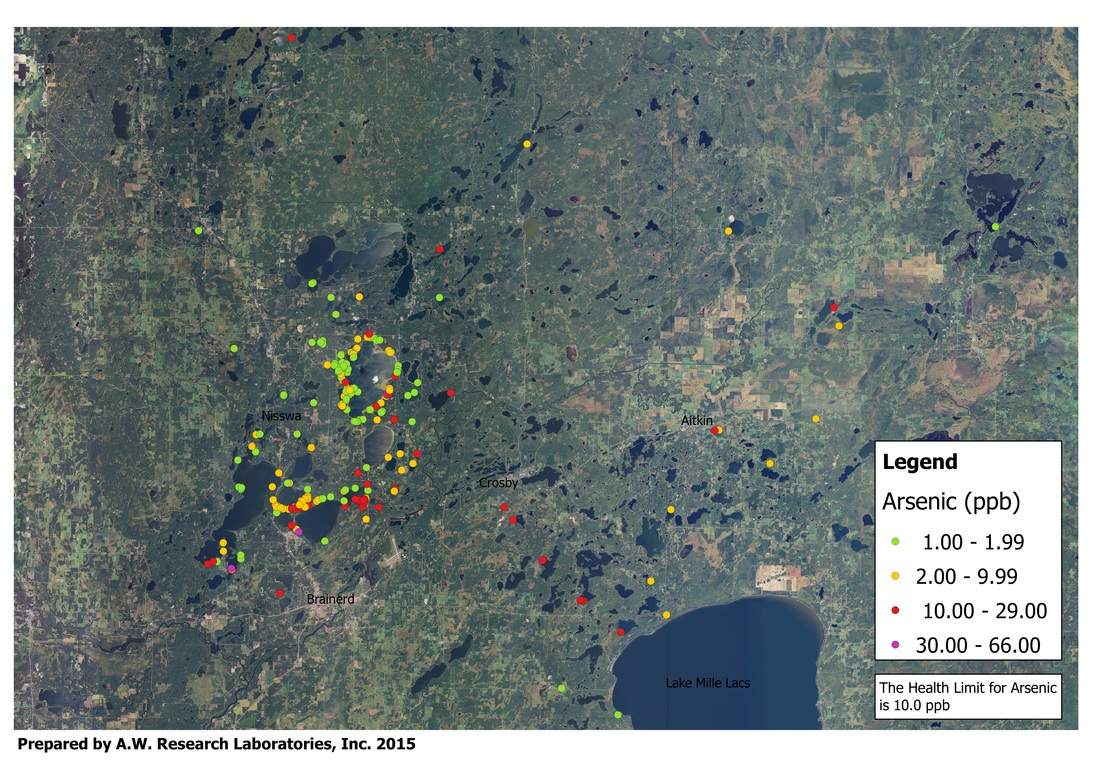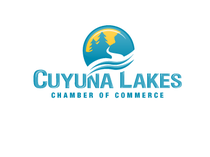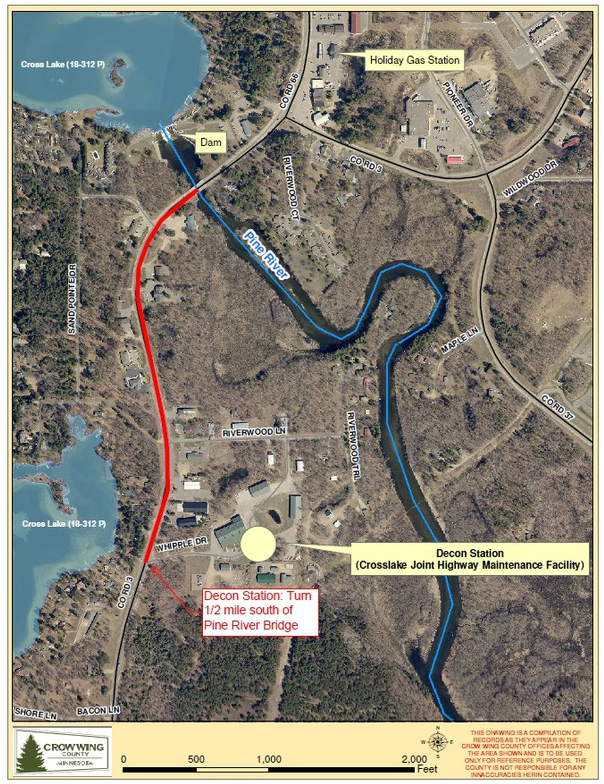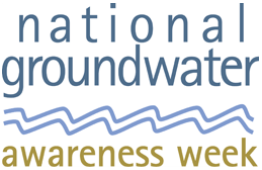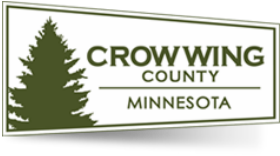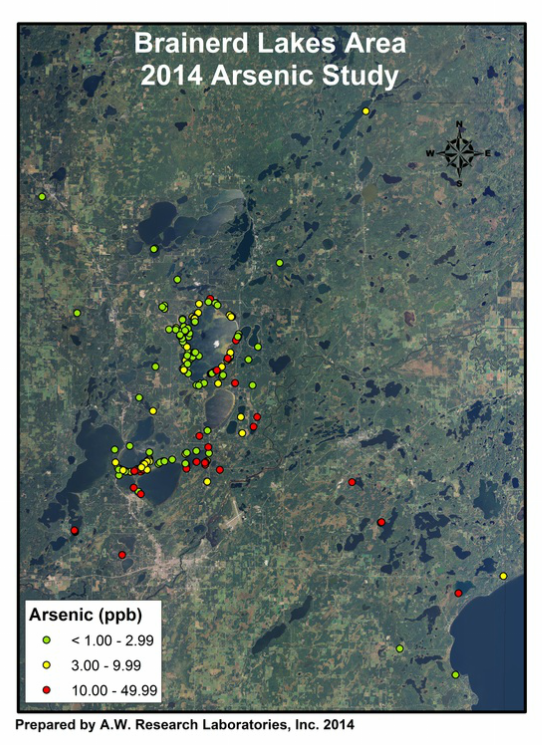Have you tested your water for arsenic? Would you like to be included on our map? Call us for details: 218-829-7974 or contact us here.
|
A.W. Research Laboratories has been working with local homeowners and lake association members to document the arsenic concentration in groundwater throughout the Brainerd Lakes Area. Our most recent maps include sample results from 2014 and 2015. The red and pink dots indicate areas where arsenic was found over the health limit of 10.0 parts per billion (ppb). Click here to learn more about arsenic testing.
Have you tested your water for arsenic? Would you like to be included on our map? Call us for details: 218-829-7974 or contact us here.
2 Comments
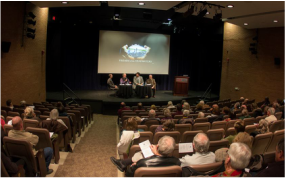 The Rosenmeier Center for State and Local Government will hold a public forum on an in-depth and focused look at the present and future of Northern Minnesota water and ways we can keep it as pure and pristine as it is now. The forum will be Monday night, October 5th at the Central Lakes College Chalberg Theater. The presentation will begin at 7:00pm. The forum, titled "Water Conservation in the Mississippi Headwaters: The latest science, methodology and collaborations," is presented by Todd Holman, of The Nature Conservancy, and Dan Steward, of the Board of Water and Soil Resources. “Our water resources in the central and northern lakes area of Minnesota appear abundant and of excellent quality," said presenter Todd Holman, "Unfortunately, all is not what it may seem.” Holman's co-presenter, Dan Steward, added “ In the last five years, Minnesota has been ranked second highest in the conversion of forest and native vegetation to agriculture, resulting in increased amounts of phosphorus and nitrogen that will, and in some cases already has, affected both our ground and surface water.” The purpose of the Rosenmeier Center for State & Local Government is to inform, to educate, and to encourage citizens of Central Minnesota to participate in effective governance, planning, and leadership; and to assist in the process of:
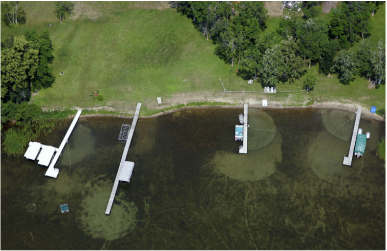 Image Credit: Star Tribune, Brian Peterson Image Credit: Star Tribune, Brian Peterson In a recent editorial published in the Star Tribune, Ron Way and Steve Berg discuss the irrevocable damage that has been done to Minnesota's lake through poor land-use practices. It's a dismal picture, especially for the southern part of our state: "Agriculture has drained or poisoned the prairie lakes and potholes of southern and southwestern Minnesota. Forget about them; they’re gone." These words are difficult for many of us to take. "Forget about them?" Really? There's always a chance for redemption, right? Actually as it turns out, for lakes, it is virtually impossible to restore a lake to pre-settlement conditions once nutrient loading has reached a certain point. Lakes with a long history of phosphorus loading achieve a "supercharged" state in which so much phosphorus is stored in the sediments that the lake ecosystem simply can't keep up and the lake will become permanently impaired. Once a lake has reached this point, even the best shoreline practices will have virtually no effect to improve water quality. The phorphorus is there for good. The damage has been done. Fortunately there is still hope for many lakes in northern Minnesota provided we act now to protect them. "But saving those lakes will require two extraordinary acts of courage: first, an acknowledgment that the laissez-faire path we’ve followed for 50 years has failed, and, second, a new resolve to pass and enforce land-use regulations that diminish the impact of human settlement. The aim shouldn’t be to inhibit future development but to change development’s character in ways that protect lakes and their surrounding watersheds." The Brainerd Lakes Area is on the edge of becoming permanently impaired due largely to rapid development of our lake shore. Small summer cabins are being turned into large year-round residences at an increasingly rapid pace. The big question is, do we have the courage to limit ourselves and our development to protect the lakes that we love? Let's hope so! The future of our lakes, our lifestyle, and our economy depends on it! After Sunday’s storm, displaced vacationers and summer travelers can contact local chambers of commerce for updated lodging availability.
The rumors of the Brainerd Lakes Area’s demise are much exaggerated. Two days since a storm caused significant damage to some of the area’s most famous resorts, that’s the message that local chambers of commerce are sending to travelers. Displaced and future visitors are urged to call the chamber offices for the most updated lodging availability across the Lakes Area. According to leaders, many smaller properties and “hidden gems” don’t list their available rooms online. That’s why the chambers say that they are the best source of information: Brainerd Lakes Chamber 800-450-2838 www.explorebrainerdlakes.com Nisswa Chamber of Commerce 218-963-2620 www.nisswa.com Cuyuna Lakes Chamber of Commerce 218-546-8131 www.cuyunalakes.com After Sunday’s storm, much of the damage was centered on the Gull Lake area, between the communities of Baxter and Nisswa. Affected properties include familiar names like Madden’s and Cragun’s resorts, which are working to clean up debris but remain optimistic about reopening within two weeks. In an effort to rescue summer vacation plans, affected properties are temporarily referring displaced guests to the chambers to find other lodging options. “There is no doubt that we had a significant event, but our beautiful area is not gone. These resorts will be back open for business much sooner than people think,” said Matt Kilian, president of the Brainerd Lakes Chamber in a press release. “In the meantime, we want visitors to know that they can still enjoy the Lakes Area. We still have some of the state’s best waters and activities that were completely unaffected by the storm.” Other area destinations include Breezy Point, Crosslake, Nisswa, Pequot Lakes and the Cuyuna Range communities of Crosby, Deerwood, Ironton and Emily. Visit the chamber’s websites for more information. Updated 8/22/2019
Crow Wing County has installed a permanent AIS Decontamination Station at the Crosslake Joint Highway Maintenance Facility at 13870 Whipple Drive in Crosslake (1/2 mile south of the dam off of County Road 3). The station will be open from 7:00 AM to 9:00 PM from Friday through Monday. Please note there is no on-call availability for the Crosslake decontamination unit starting in 2019. Decontamination at the station will consist of a hot water rinse to kill zebra mussels, and pressure wash to remove plant material from boats, motors, trailers, and other equipment. The station is operated by DNR-trained, certified inspectors who will ensure the process is effective and safe. Decontamination will be provided to boaters free of charge. For any decontamination, either mandatory or “courtesy”, the Crow Wing County Decon. Hotline can be called at 218-824-1055. The automated messaging will direct customers to decontamination stations County and Level 1 DNR inspectors will be directing boaters to the station for decontamination if it is deemed necessary per the DNR guidelines:
Click here to go to the Crow Wing County website for more information about this and other AIS prevention efforts. 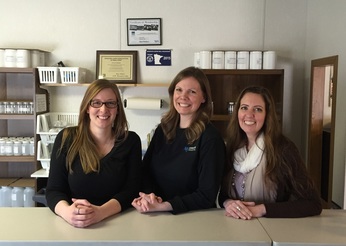 From the left: Sarah Fogderud, Sara Ahlers, and Stephanie Kuesel are the new owners of A.W. Research Labs From the left: Sarah Fogderud, Sara Ahlers, and Stephanie Kuesel are the new owners of A.W. Research Labs We are excited to announce that A.W. Research Laboratories is under new ownership for the first time in its 43 year history. The new ownership group consists of three long-term employees that have served as the management team since the death of the company’s founder, Alan Cibuzar, last year. Sara Ahlers joined A.W. Research Laboratories as Laboratory Director in 1999. Originally from Red Lake Falls, Minnesota, Ahlers attended the University of Minnesota where she received her degree in Biochemistry and Molecular Biology. Stephanie Kuesel is originally from Little Falls and has been with the company for 14 years. With degrees in Water Resource Technology and Environmental Resources, Kuesel has served as Senior Lab Technician and Laboratory Manager for A.W. Research Laboratories. Sarah Fogderud, Project Manager and Controller, is originally from Bismarck, North Dakota and has her degree in Biology from Gustavus Adolphus College. Fogderud has been with A.W. Research Laboratories since 2008. A.W. Research Laboratories will continue to operate out of our current location at the Brainerd Lakes Regional Airport providing water testing, onsite sampling and consulting services to clients throughout central Minnesota. The lab offers in-house testing services for drinking water, wastewater, surface water, groundwater, and stormwater. Nitrate Contamination of Minnesota Groundwater: economic and other implications will take place on Thursday, March 19th, at 3:00 PM. Following the presentation and discussion there will be time for networking with the speaker and audience participants. This event is free of charge and open to the public. It will be held at the Crow Wing County Land Services Building, Meeting Room 2 (lower level), 322 Laurel Street, Brainerd. The Land Services building is located just south of the historic court house. Please park in the Crow Wing County Visitor Parking Lot on the corner of Laurel and 4th Street.
To secure a long-term sustainable water future, investments are needed in watershed protection and restoration. However, these investments can be costly and lead to tradeoffs with development and other activities. In order to evaluate these tradeoffs, we need information on how water quality and quantity is changing, along with how those changes affect our social and economic wellbeing. To address this need, Dr. Bonnie Keeler, a research scientist at the Institute on the Environment where she oversees the Natural Capital Project, is studying the value of clean water in Minnesota. Along with colleagues, she recently published research on the costs of nitrate contamination and the value of clean water to lake recreation. Using tools from ecology and economics, Keeler is understanding the connections between water quality and wellbeing - information that can better inform the design of policy or incentive programs and more efficiently target investments in restoration and protection. Keeler will discuss her work on water quality valuation, along with related projects led by the Natural Capital Project that are elevating the value of nature in decision-making. For more information about this event please contact: Kristen Blann, [email protected]. The Brainerd Area Environmental Learning Network (BAELN) is proud to be offering its twelfth year of professional development and timely information on environmental and sustainability issues for professionals and community members. BAELN is a collaborative effort of: Central Lakes College, Central Regional Sustainable Development Partnership, citizen representation, Crow Wing Soil and Water Conservation District, Initiative Foundation, MN Department of Natural Resources, MN Department of Transportation, MN Pollution Control Agency, The Nature Conservancy, and University of Minnesota Extension. If you would like to be on the BAELN email list or for general information on BAELN, please contact Stephen Mikkelson at 218-316-3887, toll free at 1-800-657-3864 or [email protected].
Over the past year, our lab has been compiling the arsenic results from drinking water samples that we've received from wells in the Brainerd Lakes Area. The results have shown some interesting trends with arsenic popping up in high concentrations in several areas including Brainerd, Baxter, Nisswa, Breezy Point, and Merrifield. Overall, we found that 10% of wells tested contained arsenic levels over the federal drinking water standard of 10.0 parts per billion.
A drinking water study completed with the Pelican Lakes Association also found that in the Pelican Lake area, wells that are completed just below a clay layer at least 10 feet thick can have higher levels of arsenic than other wells. |

